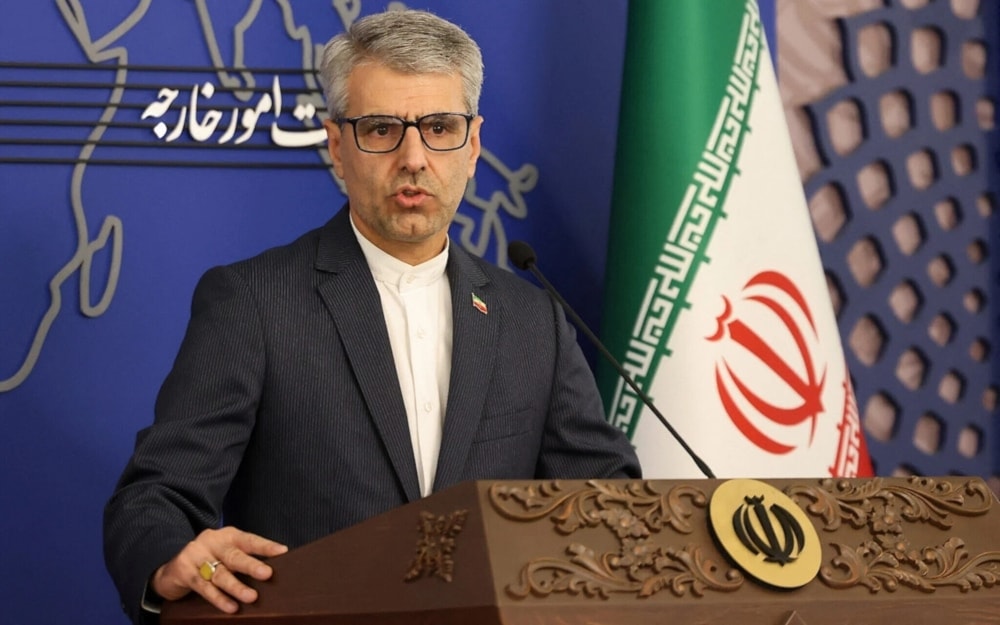Iran Foreign Ministry: Basic demand removal of unlawful sanctions
Iranian Foreign Ministry spokesperson Esmaeil Baghaei says the termination of "unlawful and cruel" sanctions is the fundamental demand of the Islamic Republic in every negotiation.
-
 Iran's Foreign Ministry spokesman, Esmaeil Baghaei, holds the weekly press conference in Tehran on October 28, 2024 (AFP)
Iran's Foreign Ministry spokesman, Esmaeil Baghaei, holds the weekly press conference in Tehran on October 28, 2024 (AFP)
Iranian Foreign Ministry spokesperson Esmaeil Baghaei addressed reporters at his regular Monday press briefing, following two rounds of indirect negotiations between Iran and the United States regarding Iran's nuclear program.
“All sanctions imposed on the Islamic Republic of Iran are unjustifiable, unlawful, and cruel. Therefore, we do not distinguish between the sanctions which have been imposed on us under different pretexts and titles,” he said.
He emphasized that lifting sanctions remains Iran's central demand in every negotiation, and that such efforts must result in practical and meaningful changes.
Baghaei pointed out that Iran must have the ability to conduct its economic, trade, and banking activities without obstruction. He underlined the importance of obtaining guarantees that prevent a repeat of past negative experiences.
Baghaei also reaffirmed that Tehran must be confident that its indirect engagement with Washington would produce sustainable and specific outcomes, and that all parties involved must be committed to honoring their obligations.
The two rounds of high-level, indirect negotiations, focused on Iran’s nuclear activities and the potential lifting of US sanctions, were led by Iranian Foreign Minister Abbas Araghchi and Steve Witkoff, the US president’s special envoy for West Asia. These meetings took place in Muscat, Oman, and Rome, Italy, on April 12 and April 19, respectively, with Omani Foreign Minister Badr bin Hamad Al Busaidi serving as mediator.
At the conclusion of the second meeting on Saturday, Araghchi announced that Tehran and Washington had achieved a “better understanding” regarding certain principles and objectives.
Both sides have agreed to hold technical-level talks in Oman on April 23. A third round of indirect, high-level negotiations between Araghchi and Witkoff is scheduled for April 26 to review the outcomes of the expert discussions and assess progress toward an agreement.
Second round of indirect talks
The spokesperson praised Oman’s professionalism in hosting and facilitating the discussions between Tehran and Washington.
He noted that Oman had suggested holding the second round of talks in a location other than Muscat, and all three parties reached a consensus on the new venue.
He also acknowledged the Italian government’s constructive support and cooperation.
Responding to questions about Iran’s coordination with other signatories of the 2015 Joint Comprehensive Plan of Action (JCPOA), Baghaei stated, “China and Russia are two important members of the [United Nations] Security Council and Iran’s friends and have always been informed about relative trends.”
He explained that Beijing and Moscow were briefed on the Iran-US negotiations from the outset and added, “We even consulted with the three European members of the JCPOA (France, Germany and Italy) and we will continue to do so.”
The spokesperson added that UN Security Council Resolution 2231, which underpins the JCPOA, remains in effect and that consultations with its signatories are necessary throughout the process.
During his first presidential term, Donald Trump withdrew the United States from the JCPOA and reimposed sanctions as part of a "maximum pressure" strategy against Iran.
Upon returning to office in January, Trump reinstated this policy, but has since expressed a willingness to negotiate a new deal to replace the JCPOA.
Iran knows well how to respond to threats
When asked about threats against Iran’s nuclear infrastructure, Baghaei responded, “Iran is not supposed to change its policy regarding the threat of the use of force. We know very well how to respond to any threats.”
He also addressed conflicting US positions, stating that Iran would focus on tangible actions and avoid being influenced by inconsistent rhetoric.
The Iranian spokesperson condemned attacks on Yemen, calling them violations of international law aimed at supporting what he described as "Israel's" genocide in Gaza.
“The continued crimes of the Zionist regime in Gaza and its aggression against the regional countries are the problem in our region. These attacks against Yemen are nothing but complicity in the aggressions of the Zionist regime,” Baghaei added.
He strongly denounced Israeli actions and expressed disappointment that the United Nations, its Security Council, and self-proclaimed defenders of human rights have remained silent in the face of these alleged atrocities.
Concluding his press conference, Baghaei expressed Iran’s condolences following the passing of Pope Francis, the head of the Catholic Church, who died on Monday at the age of 88.

 5 Min Read
5 Min Read









